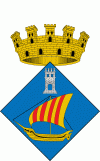Salou
 |
 |
Founded by the Greeks in the 6th century B.C., the coastal town was a notable commercial port during medieval and modern ages. Throughout the 20th century, Salou became an important European tourist attraction.
Aside from its string of beaches interrupted by rocky coves, and its landscaped promenade, one of its main attractions is the PortAventura World resort. The Dutch movie Costa! and the television series with the same title were both filmed in Salou.
Used as a port by Greeks (who named it Salauris) and Romans, it appeared again in an important historic event, when in 1229 the fleet of James I of Aragon departed from the port of Salou to conquer the Balearic Islands, thus creating the Kingdom of Majorca.
In 1286 Alfons III of Aragon also departed from this port to conquer Menorca, the last Moorish territory of the Balearic Islands.
Later, Salou became a nest of pirates. After that it was considered an unsafe place, so in 1530 Archbishop of Tarragona decided to erect a new defence tower, now called Torre Vella.
In 1865 the railway station began to operate, opening a new development time, that led one hundred years later to a tourist boom that has brought prosperity to the town. Salou was separated from the adjacent municipality of Vila-seca on 30 October 1989 by a decision of the Supreme Court of Spain.
In the summer of 2001, Salou suffered a terrorist attack by ETA, through a car bomb near a hotel. 13 people were injured, including two civil guards.
Map - Salou
Map
Country - Spain
 |
 |
| Flag of Spain | |
Anatomically modern humans first arrived in the Iberian Peninsula around 42,000 years ago. The ancient Iberian and Celtic tribes, along with other pre-Roman peoples, dwelled the territory maintaining contacts with foreign Mediterranean cultures. The Roman conquest and colonization of the peninsula (Hispania) ensued, bringing the Romanization of the population. Receding of Western Roman imperial authority ushered in the migration of different non-Roman peoples from Central and Northern Europe with the Visigoths as the dominant power in the peninsula by the fifth century. In the early eighth century, most of the peninsula was conquered by the Umayyad Caliphate, and during early Islamic rule, Al-Andalus became a dominant peninsular power centered in Córdoba. Several Christian kingdoms emerged in Northern Iberia, chief among them León, Castile, Aragon, Portugal, and Navarre made an intermittent southward military expansion, known as Reconquista, repelling the Islamic rule in Iberia, which culminated with the Christian seizure of the Emirate of Granada in 1492. Jews and Muslims were forced to choose between conversion to Catholicism or expulsion, and eventually the converts were expelled through different royal decrees.
Currency / Language
| ISO | Currency | Symbol | Significant figures |
|---|---|---|---|
| EUR | Euro | € | 2 |
| ISO | Language |
|---|---|
| EU | Basque language |
| CA | Catalan language |
| GL | Galician language |
| OC | Occitan language |
| ES | Spanish language |















